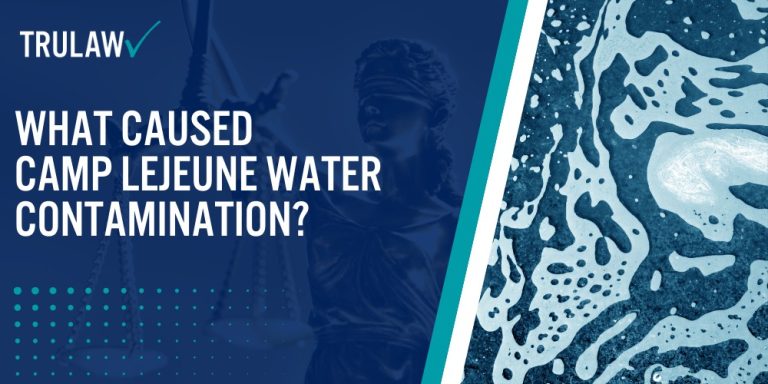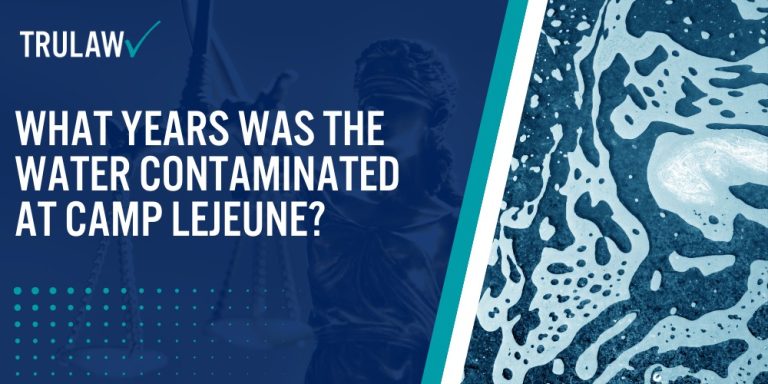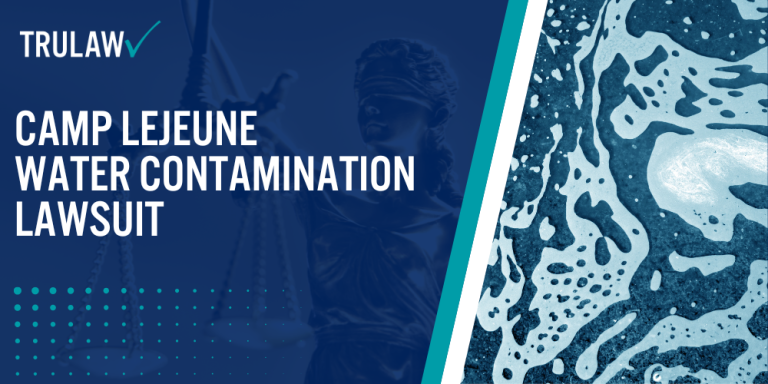How to File a Claim for Camp Lejeune Water Contamination
- Last Updated: April 14th, 2025

Attorney Jessica Paluch-Hoerman, founder of TruLaw, has over 28 years of experience as a personal injury and mass tort attorney, and previously worked as an international tax attorney at Deloitte. Jessie collaborates with attorneys nationwide — enabling her to share reliable, up-to-date legal information with our readers.
Legally Reviewed
This article has been written and reviewed for legal accuracy and clarity by the team of writers and legal experts at TruLaw and is as accurate as possible. This content should not be taken as legal advice from an attorney. If you would like to learn more about our owner and experienced injury lawyer, Jessie Paluch, you can do so here.
Fact-Checked
TruLaw does everything possible to make sure the information in this article is up to date and accurate. If you need specific legal advice about your case, contact us by using the chat on the bottom of this page. This article should not be taken as advice from an attorney.
How to File a Claim for Camp Lejeune Water Contamination
On this page, we’ll discuss how to file a claim for Camp Lejeune water contamination if you or a loved one has been effected, the Camp Lejeune Justice Act of 2022, steps in the Camp Lejeune claim process, and much more.
Who Is Eligible to File A Camp Lejeune Water Contamination Claim?
Hundreds of thousands of veterans, their family members, and civilian workers who served and lived at Camp Lejeune in North Carolina from 1953 to 1987 were exposed to contaminated water containing harmful chemicals.
Tragically, many of those who were exposed to the contaminated water on the base were later diagnosed with certain types of cancer and other adverse health effects.
Individuals who were diagnosed with certain serious health conditions after living and working at Camp Lejeune may be eligible to recover compensation through a federal claim with the Camp Lejeune Justice Act now approved by Congress and signed into law.
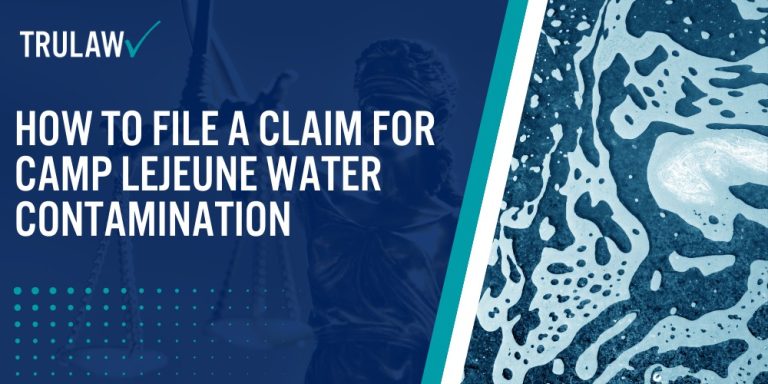
To qualify for a Camp Lejeune water contamination lawsuit, the plaintiff must have resided at the Marine Corps base for a period of at least 30 days between August 1, 1953, and December 31, 1987.
This includes active-duty service members and veterans, family members of veterans who lived at the camp, civilian staff, families of deceased individuals, and even individuals who were in-utero at the time of exposure.
Individuals who are dishonorably discharged might not qualify for a lawsuit even if they meet the other eligibility requirements.
Table of Contents
The Camp Lejeune Justice Act of 2022
Victims of water contamination at Camp Lejeune previously had no legal recourse to pursue compensation for damages they suffered after living on the base.
Under the 2012 Janey Ensminger Act, which was signed into law during the Obama administration, the family members of veterans who were diagnosed with specific cancers and other diseases after living at Camp Lejeune have the ability to recover healthcare benefits through Veterans Affairs.
However, they were still time-barred from bringing a claim against the government and other potentially liable parties because of North Carolina’s statute of repose against polluters.
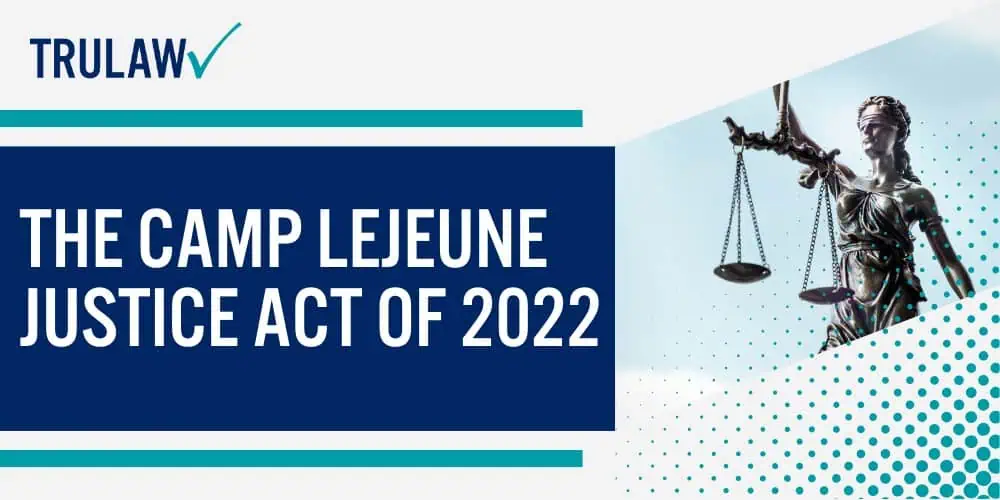
The statute of repose against polluters in North Carolina allows victims just ten years to file a lawsuit for compensation.
And because the clock on the statute of repose begins ticking when the defendant first engages in negligent conduct, the statutory deadline passed long before the water at Camp Lejeune was determined to be contaminated.
The new bill removes the legal barrier that previously prevented victims of the base’s contaminated water from taking legal action.
Steps in the Camp Lejeune Legal Process
Plaintiffs in Camp Lejeune water contamination cases will likely be filing their lawsuits in the United States District Court for the Eastern District of North Carolina.
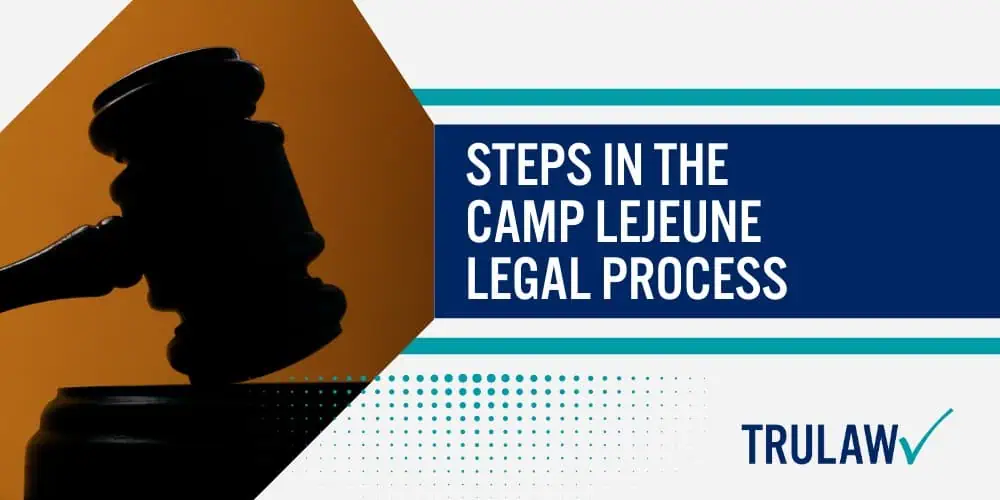
However, there are numerous steps that plaintiffs must take before they file a complaint in federal court.
1. Gather evidence
One of the first steps that victims will need to take is gathering evidence to prove that their condition was caused by water contamination on the base.
Under the Janey Ensminger Act, victims do not have to prove a direct link between the water contamination and their condition to receive healthcare from VA.
They merely have to show that they lived on the base for at least 30 days during the allotted time frame.
However, in a civil lawsuit, victims will need to demonstrate that the government or another defendant was negligent and that their negligence led directly to the plaintiff’s condition.
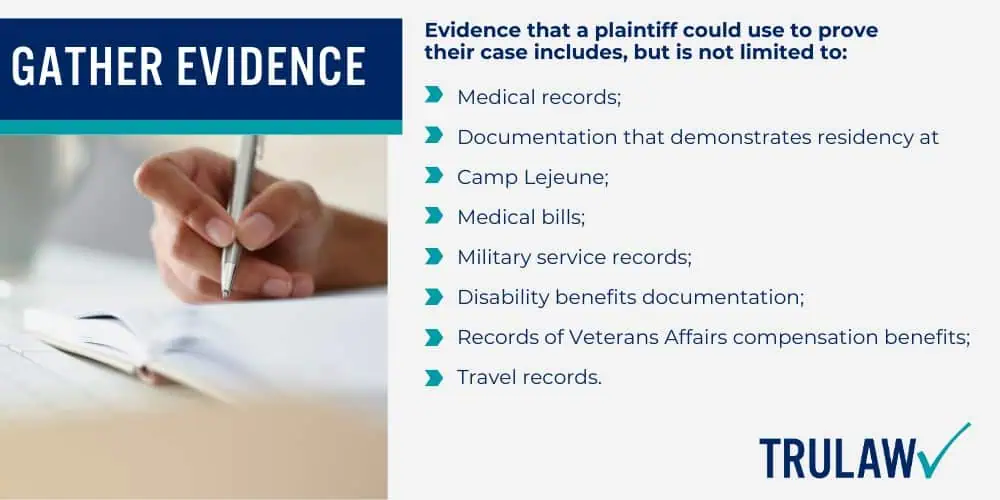
Evidence that a plaintiff could use to prove their case includes, but is not limited to:
- Medical records;
- Documentation that demonstrates residency at Camp Lejeune;
- Medical bills;
- Military service records;
- Disability benefits documentation;
- Records of Veterans Affairs compensation benefits; and
- Travel records.
2. Hire a lawyer
While you are not required to hire an attorney to represent you, you will significantly improve your chances of obtaining a positive outcome if you have legal representation.

Your attorney can help you in many ways, including, but not limited to:
- Providing you with legal advice;
- Representing you in court;
- Advocating for your interests;
- Defending your rights; and
- Negotiating a settlement with the at-fault party.
3. Document losses
For your lawsuit to be successful, you will need to show that you suffered compensable losses.
Compensable losses can be financial or non-financial and might include medical expenses, lost wages, pain and suffering, and more.
It can be challenging to document losses on your own, particularly when it comes to non-financial ones.
A skilled lawyer can help you quantify your non-financial losses and assess the total value of your claim.
4. Identify the liable party or parties involved
Determining liability is another crucial step in filing a civil lawsuit.
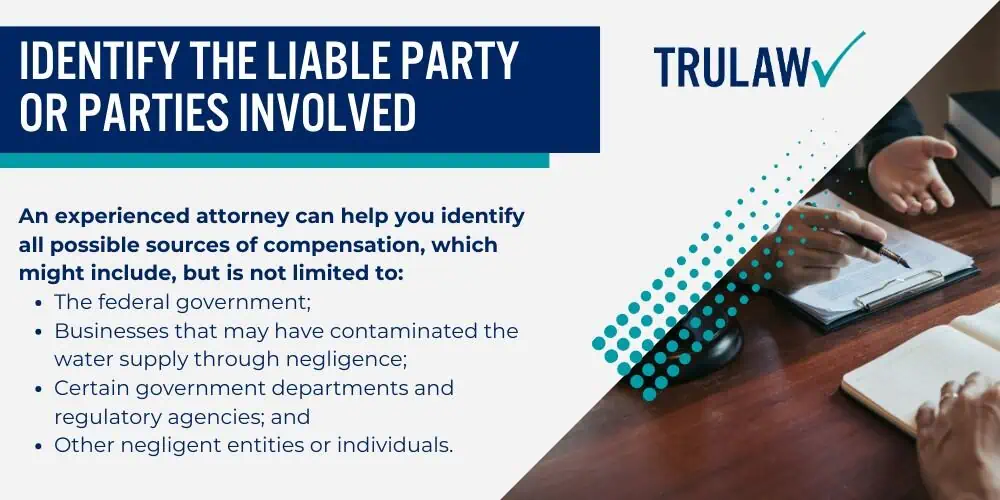
An experienced attorney can help you identify all possible sources of compensation, which might include, but is not limited to:
- The federal government;
- Businesses that may have contaminated the water supply through negligence;
- Certain government departments and regulatory agencies; and
- Other negligent entities or individuals.
With the Camp Lejeune Justice Act now signed into law, the attorneys at TruLaw are prepared to take on cases and help victims secure the financial relief they deserve.
It is also possible that there will be a class-action lawsuit filed on behalf of Camp Lejeune water contamination victims.
In 2011, a Camp Lejeune class-action lawsuit was filed in federal court against the United States government, but the case was dismissed due to the statute of repose.
With the passing of the Camp Lejeune Justice Act, it is possible that any class-action suit would proceed because the statute of repose will not apply to the Camp Lejeune water contamination cases.
You can find information on the filing process, rules, updates, and more information on our frequently updated page for the Camp Lejeune contaminated water lawsuit.
If you suffered adverse health issues after being exposed to contaminated water while living at Camp Lejeune in North Carolina, TruLaw can help.
Visit our Camp Lejeune Contaminated Water Lawsuit page and get an instant case assessment.

Managing Attorney & Owner
With over 25 years of legal experience, Jessica Paluch-Hoerman is an Illinois lawyer, a CPA, and a mother of three. She spent the first decade of her career working as an international tax attorney at Deloitte.
In 2009, Jessie co-founded her own law firm with her husband – which has scaled to over 30 employees since its conception.
In 2016, Jessie founded TruLaw, which allows her to collaborate with attorneys and legal experts across the United States on a daily basis. This hypervaluable network of experts is what enables her to share the most reliable, accurate, and up-to-date legal information with our readers!
You can learn more about the Camp Lejeune Water Contamination Lawsuit by visiting any of our pages listed below:
Here, at TruLaw, we’re committed to helping victims get the justice they deserve.
Alongside our partner law firms, we have successfully collected over $3 Billion in verdicts and settlements on behalf of injured individuals.
Would you like our help?
At TruLaw, we fiercely combat corporations that endanger individuals’ well-being. If you’ve suffered injuries and believe these well-funded entities should be held accountable, we’re here for you.
With TruLaw, you gain access to successful and seasoned lawyers who maximize your chances of success. Our lawyers invest in you—they do not receive a dime until your lawsuit reaches a successful resolution!
AFFF Lawsuit claims are being filed against manufacturers of aqueous film-forming foam (AFFF), commonly used in firefighting.
Claims allege that companies such as 3M, DuPont, and Tyco Fire Products failed to adequately warn users about the potential dangers of AFFF exposure — including increased risks of various cancers and diseases.
Depo Provera Lawsuit claims are being filed by individuals who allege they developed meningioma (a type of brain tumor) after receiving Depo-Provera birth control injections.
A 2024 study found that women using Depo-Provera for at least 1 year are five times more likely to develop meningioma brain tumors compared to those not using the drug.
Suboxone Tooth Decay Lawsuit claims are being filed against Indivior, the manufacturer of Suboxone, a medication used to treat opioid addiction.
Claims allege that Indivior failed to adequately warn users about the potential dangers of severe tooth decay and dental injuries associated with Suboxone’s sublingual film version.
Social Media Harm Lawsuits are being filed against social media companies for allegedly causing mental health issues in children and teens.
Claims allege that companies like Meta, Google, ByteDance, and Snap designed addictive platforms that led to anxiety, depression, and other mental health issues without adequately warning users or parents.
Transvaginal Mesh Lawsuits are being filed against manufacturers of transvaginal mesh products used to treat pelvic organ prolapse (POP) and stress urinary incontinence (SUI).
Claims allege that companies like Ethicon, C.R. Bard, and Boston Scientific failed to adequately warn about potential dangers — including erosion, pain, and infection.
Bair Hugger Warming Blanket Lawsuits involve claims against 3M — alleging their surgical warming blankets caused severe infections and complications (particularly in hip and knee replacement surgeries).
Plaintiffs claim 3M failed to warn about potential risks — despite knowing about increased risk of deep joint infections since 2011.
Baby Formula NEC Lawsuit claims are being filed against manufacturers of cow’s milk-based baby formula products.
Claims allege that companies like Abbott Laboratories (Similac) and Mead Johnson & Company (Enfamil) failed to warn about the increased risk of necrotizing enterocolitis (NEC) in premature infants.
Here, at TruLaw, we’re committed to helping victims get the justice they deserve.
Alongside our partner law firms, we have successfully collected over $3 Billion in verdicts and settlements on behalf of injured individuals.
Would you like our help?
